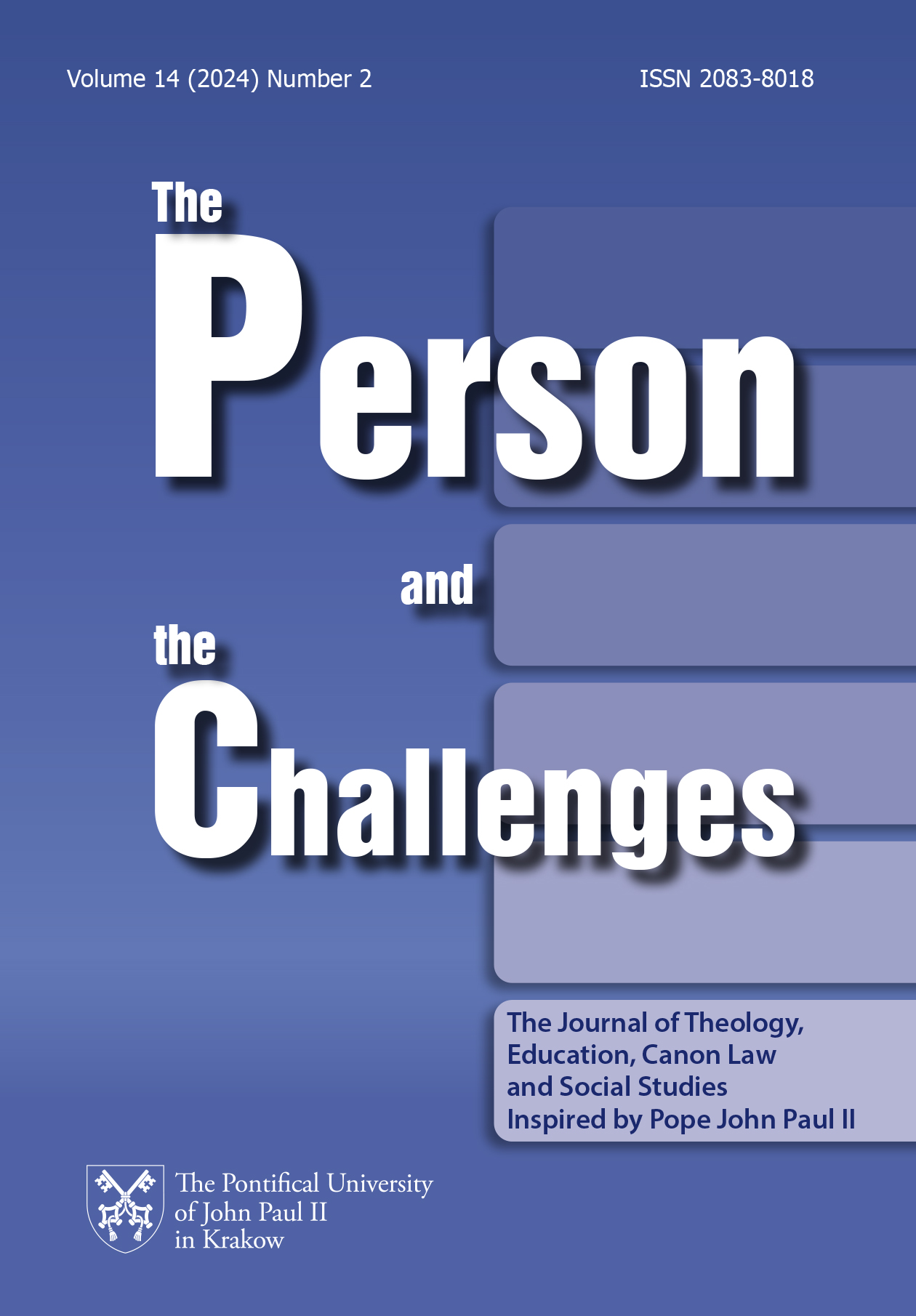Changes in Religiosity as a Challenge to Family Catechesis: the Situation in Poland
DOI:
https://doi.org/10.15633/pch.14215Keywords:
Changes in religiosity, models, family catechesisAbstract
The concept ‘catechesis’ has always been vital to pastoral mission in Roman Catholic Church and has been used officially with a basic fidelity to its etymological roots (an echoing of faith between believers and with fidelity to its context in the early Christian Church (systematic formation and participation in experiences within a faith community). However today, when official Roman Catholic Church documents recall family catechesis, at the practical level, family catechesis is still ambiguous. This article opens a new window on a very topical issue in contemporary catechesis: strengthening the family as an important agent of catechesis. The author (taking into consideration the changes of religiosity of Catholics) proposes different models in which the family can be supported to assume its primary function as an educator for the faith using the example of Poland.
References
Alberich E., Katecheza dzisiaj. Podręcznik katechetyki fundamentalnej, Warszawa 2003.
Boguszewski R., Religijność Polaków i ocena sytuacji Kościoła katolickiego, https://cbos.pl/SPISKOM.POL/2018/K_147_18.PDF (10.08.2023).
Education and Creativity, ed. E. Osewska, Warszawa 2014.
Jan Paweł II, Familiaris consortio, 22 XI 1981, in: Adhortacje Ojca Świętego Jana Pawła II, Kraków 1996, pp. 87–208.
Jan Paweł II, Gratissimum sane, 2 II 1994, in: Listy pasterskie Ojca Świętego Jana Pawła II, Kraków 1997, pp. 247–327.
Kawecki W., Czym jest locus theologicus kultury wizualnej?, in: Wierzyć i widzieć, pp. 31–45.
Kawecki W., Teologia piękna. Poszukiwanie locus theologicus w kulturze współczesnej, Poznań 2013.
Kawecki W., Teologia wobec kultury wizualnej, in: Miejsca teologiczne w kulturze wizualnej, Kraków — Warszawa 2013, pp. 15–29.
Konferencja Episkopatu Polski, Dyrektorium katechetyczne Kościoła katolickiego w Polsce, 20 VI 2001, Kraków 2001.
Kongregacja do Spraw Duchowieństwa, Dyrektorium ogólne o katechizacji, 15 VIII 1997, Poznań 1998.
Król J., Psychologiczne aspekty badania fenomenu religii, Opole 2002.
Królikowski J., Nieme słowo. Teologia w sztuce, Tarnów 2008.
Królikowski J., Widzialne słowo. Teologia w sztuce, Tarnów 2009.
Królikowski J., Zobaczyć wiarę. Obraz i doświadczenie wiary w Kościele, in: Wierzyć i widzieć, eds. K. Flander, D. Jaszewska, W. Kawecki, B. Klocek di Biasio, E. Mazur, N. Mojżyn, J.S. Wojciechowski, M. Wrześniak, D. Żukowska-Gardzińska, Sandomierz 2013.
Kukołowicz T., Osoba i czyn a wychowanie w rodzinie, „Analecta Cracoviensia” (1973–1974), t. V–VI, pp. 211–221.
Kultura wizualna — teologia wizualna, eds. W. Kawecki, J.S. Wojciechowski, D. Żukowska-Gardzińska, Warszawa 2011.
Majka J., Proces sekularyzacji rodziny i problem odnowy jej religijnego charakteru, in: Ewangelizacja, ed. J. Krucina, Wrocław 1980.
Mariański J., Charakterystyka religijno-moralna współczesnej młodzieży, in: Katecheza młodzieży, ed. S. Kulpaczyński, Lublin 2003, pp. 15–70.
Mariański J., Religijność społeczeństwa polskiego w perspektywie europejskiej. Próba syntezy socjologicznej, Kraków 2004.
Osewska E., Rodzina i szkoła w Polsce wobec współczesnych wyzwań wychowawczych, Kraków 2020.
Piwowarski W., Funkcje rytuału religijnego, in: Rytuał religijny w rodzinie, eds. W. Piwowarski, W. Zdaniewicz, Warszawa — Poznań 1988, pp. 82–84.
Piwowarski W., Przemiany religijnej funkcji rodziny. Problematyka i hipotezy, „Studia Warmińskie” 11 (1974), pp. 405–453.
Polak R., Tęsknota za Bogiem. Wyzwania pastoralne w Europie w kontekście procesów transformacji religijnej, „Homo Dei” 78 (2009) 4, pp. 13–20.
Potocki A., Wychowanie religijne w polskich przemianach. Studium socjologicznopastoralne, Warszawa 2007.
Rodzina w nauczaniu Jana Pawła II, ed. J. Żukowicz, Kraków 1990.
Stala J., Die Polen angesichts der Umbrüche im politischen und gesellschaftlichen Bereich. Ein Vierteljahrhundert nach der Unabhängigkeit Polens, „The Person and the Challenges“ 5 (2015) nr 1, pp. 191–199.
Stala J., Katechese im Zeitalter der Postmoderne. „Grundsatzprogramm für die Katechese der Kirche in Polen“ aus dem Jahr 2010, „Bogoslovni vestnik“ 74 (2014) nr 1, pp. 107–117.
Stala J., Osewska E., Fundamentalne podstawy i obszary katechezy rodzinnej, Tarnów 2000.
Stala J., Punina postojanja osobe — civilizacija ljubavi u kontekstu postmoderne, „Crkva u svijetu” (2015) nr 3, pp. 469–477.
Styczeń T., Człowiek darem. Na marginesie Jana Pawła II teologii ciała, in: Z badań nad rodziną, ed. T. Kukołowicz, Lublin 1984, pp. 47–51.
Wilk J., Pedagogika rodziny. Zagadnienia wybrane, Lublin 2016.
Downloads
Published
Issue
Section
License

This work is licensed under a Creative Commons Attribution 4.0 International License.
Authors who publish with this journal agree to the following terms:
- Authors retain the copyright and full publishing rights without restrictions, and grant the journal right of first publication with the work simultaneously licensed under a Creative Commons Attribution 4.0 International License that allows others to share the work with an acknowledgement of the work's authorship and initial publication in this journal.
- Authors are able to enter into separate, additional contractual arrangements for the non-exclusive distribution of the journal's published version of the work (e.g., post it to an institutional repository or publish it in a book), with an acknowledgement of its initial publication in this journal.
- Authors are permitted and encouraged to post their work online (e.g., in institutional repositories or on their website) prior to and during the submission process, as it can lead to productive exchanges, as well as earlier and greater citation of published work (See The Effect of Open Access).

